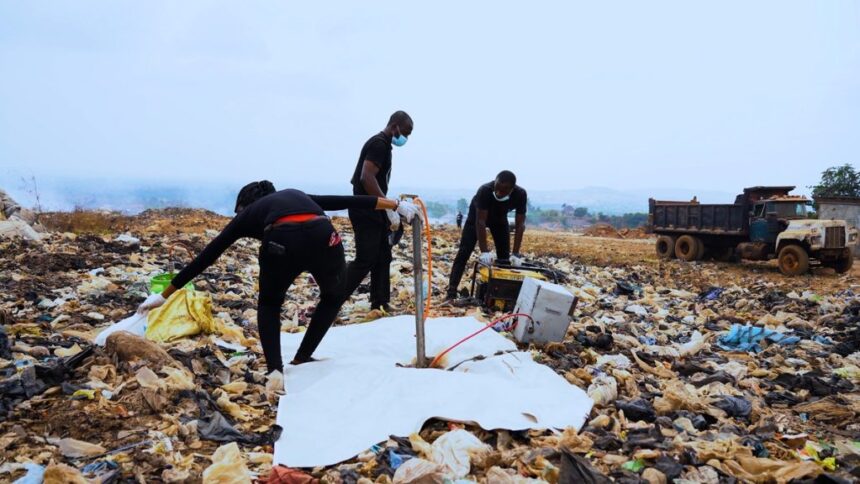The road from Enugu to a landfill site out of town was eerily quiet early on the Sunday morning a team of young scientists from the University of Nigeria readied to go sample collecting. A lone tuk-tuk chugged along a well-laid avenue lined with willow trees; there was almost no traffic at the circle where a statue of Athena, her sword suggesting a tough version of justice, stood, alabaster and gold in the morning light.
Closer to the landfill site, at two-hour drive away in Awka, in Anambra State the traffic became denser, the road a dual highway. A suspension bridge framed the dual carriageway and a little later, the turnoff to the site was announced by a large signboard advertising a road project of the state government, part of a sprawling network of new roads in the fast-growing neighbourhood.
Once at the site, the team lost their drive-induced lethargy, springing into motion to unpack the load of gear in the van – including a generator, hoses, plastic sheeting, field thermometers, sample bottles, high-pressure pump and a gas canister. Braving the smokey atmosphere and swirls of dust picked up by a growing breeze, they walked out and onto the landfill and chose a site for their collections.
The students’ supervisor, Professor Chioma Amadi watched from behind a facemask as the group began their sample-gathering preparations.
“I am here with some of our students to collect soil samples and also to collect landfill gas samples for analysis in the lab,” explained Amadi, pointing out the site they would be using.
Nigeria generates some 32 million tons of waste annually, of which some 7% is collected and disposed of in landfill sites like the one chosen for the morning’s scientific activities. Enormous amounts of methane, a potent greenhouse gas, are released by the breakdown of food and other organic substances in the buried waste.

Amadi has been overseeing this project, started by one of her microbiology Masters students at the University of Nigeria, situated in Enugu state, since early 2024. The university’s new and imposing microbiology unit is situated at the Nsukka campus of UNN, which as the country’s first indigenous university, was established in 1955 and the original campus dates to 1960. It is there that the team will analyse the samples they have collected.
“We want to be able to isolate methanotrophic bacteria from the soil samples… and also to collect landfill gas for analysis in the lab. We need the soil samples to be able to isolate methanotrophic bacteria and then we need the landfill gas to serve as a carbon source for our methantrophic bacteria which we isolate” explained the Professor.
Methanotropic bateria are microbes that can metabolise methane. That’s potentially useful in a country that pumps out huge amounts of methane – from landfill sites, from oil and gas installations and from cattle – every year.
The project is the brainchild of masters student Luke Chidozie Okafor, who recognised the opportunity to grow methane-gobbling microbes to help consume large quantities of methane emitted in Nigeria from landfills, oil and gas extraction, and cattle farming. His innovation is built on the back of recent global research on the bacteria and their capacity not only to consume methane but also to deal with its many ingredients including compounds that make it expensive to process in any other way than burning – or flaring.
“Methanotrophs are incredibly important microbes in terms of our climate but also in our future sustainable society. Their role in greenhouse gas cycling and production of sustainable bio-based chemical is indisputable, providing new opportunities to realize the concept of ‘’methane-based bio-industry,” wrote Jia Wang, David R. Salem and Rajesh K. Sani in a 2020 paper entitled Microbial Polymers Produced from Methane”
At the landfill site, the group of young scientists, including three masters scientists and three pharmacy students, were not only collecting methane by pumping into the cylinder from deep in the landfill, but also samples of earth. The earth contains the microbes. In addition to being able to digest methane, these microbes have another “superpower”: they excrete the digested methane as a biodegradable polymer that can be used as a replacement for plastic.
The team of students took the heat, dust and wind in their stride as they completed their sample collection and packed the equipment back in the van for the long ride back to campus.
Recent studies globally have shown that using biodegradable polymers to replace plastics that can take hundreds of years to degrade is possible. Until now, the problem has been to find cheap sources of methane to make the process commercially viable.
Nigeria has methane in abundance. In fact, this abundance of methane has been a growing problem for the country.
“One of the major reasons why methane is a big problem in (the) environment is that it is a potent greenhouse gas, meaning that it is more powerful – and warming the atmosphere – compared to other greenhouse gases,” team leader Okafor said, speaking after the group checked in at a methane collection on their way back to the lab.
Recent studies have shown that landfill methane could be utilised as a food source for the microbes.
“The emanated methane from landfill could potentially be re-routed for bioplastic production using methanotrophs,” wrote K. Chidambarampadmavathy, O.P Karthikeyan, R. Huerlimann, G.E. Maes and K. Heimann in a paper published in Waste Management 61, in 2017.
The other obvious food source for the microbes is the methane emitted by the oil and gas industry. The country emits as much as 4.5 million tons of methane annually, 70% of that from the oil and gas industry, according to the African Policy Research Initiative, making Nigeria one of the top ten methane emitters in the world.
The gas is usually burned off in the form of flaring. This in itself is a huge problem as the gas is then turned into carbon dioxide – the biggest culprit in global warming.
Nigeria has committed to reducing flaring, signing up to the Global Gas Flaring Reduction Partnerships (GCFR) principles and in 2016 endorsing the World Bank Zero Routine Flaring by 2030 initiative. Nevertheless, regular gas flaring continues and new solutions are needed. Those are going to have to come from inside the country, Okafor believes.
“Our problem is indigenous to us. None can solve that problem except us,” Okafor explained.
Okafor is determined to help Nigeria find ways to diminish the country’s hefty environmental footprint and he and his team are exploring a number of different opportunities, using the methane-munching microbes in innovative ways.
“Those microorganisms that we have isolated should be able to produce large quantities of polyhydroxybiturate that we can purify and see how plastics can be produced from them. We are also looking at a situation where we have enough of those organisms – biomass – that can serve as animal feed, as single-cell proteins” explained Professor Amadi.
Established science backs the team’s ambitions.
Methane represents an enormous resource and opportunity for conversion into higher value products, especially if it can be sourced from stranded natural gas deposits that are not economical to process for conventional heating, or from sustainable point sources, such as high rate digesters or capped landfills,” wrote P.J. Strong, M. Klyuzhnay, J. Silverman and W.P. Clarke in a 2016 paper in Bioresource Technology, entitled “A methanotroph-based biorefinery: Potential scenarios for generating multiple products from a single fermentation.”
The team’s ambitions have drawn attention well beyond Nsukka; in addition to support from the university, the team is now also being funded by 3 E’s 4 Africa, a diaspora-led organisation focused that promotes sustainable and innovative solutions across the continent. Once back at the well-equipped lab, the professor and the rest of the team were quick to exchange field uniforms for lab coats as they got down to business, checking on the makeup of the landfill methane and analysing the soil samples to see whether the microbes they had collected were a better fit for the program than previous samples.
“We are looking at trying to use these methanotropic bacteria to produce PHB and even some other compounds like a single-cell protein and so many other biotechnological relevant compounds,” explained Job Chinagorom Eleke, in between testing earth samples.
The team is highly motivated by the opportunity that a successful outcome might represent – in terms of positive health outcomes for those who live around gas flaring and landfill sites as well as environmentally and commercially.
“When I heard of this project, I indicated interest, because I love the whole concept. If you think of this project, basically, we are turning waste into wealth,” explained Nadia Chizimuzor Iloka, a pharmacy student and one of the six team members.
“I joined the team because I am interested in climate changes and the health part of it. Both of them together,” said Sylvia Mmesomachi Mbaji, a Bsc Pharmacy graduate.
“Climate change – that is keeping the environment clear, and then the health part – making sure that people live in a good and conducive environment. Thereby reducing the rate at which people die of different diseases,” said Olive Chinezerem Egbuchelem, also a pharmacy student at UNN.
“I want to play my part in taking care of the planet. So, when my professor told me about this project, I was like interested, ‘cause I want to see if we can come up with alternative products that replace the fuel-based plastics that we use and that destroy the environment.”
The big picture? Something that project leader Okafor is passionate about…
“This leads to what we call a methane-based bioeconomy,” he explained.
So, what comes next?
“I believe Africa scientists have done their work in the research labs and in the field. They will need help in taking it beyond, you know, the research aspect of it,” said the professor.
With growing numbers of startup investors and African philanthropists looking for potential projects, anything is possible. Certainly, Nigeria’s can-do spirit and an abundant supply of methane leaves the country well-positioned to leapfrog into the economy Okafor dreams of.














